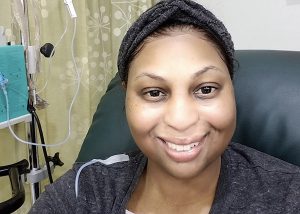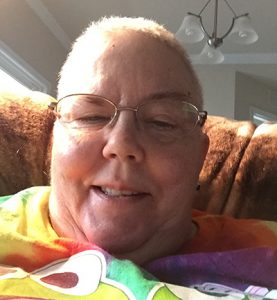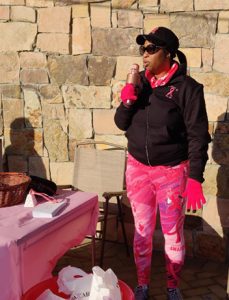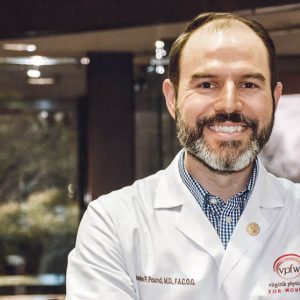Dr. Pound discusses considerations for diagnosis before and after menopause and offers ways to find relief and support
A diagnosis of breast cancer comes with a whole slew of questions, decisions, and considerations to discuss with your oncologist and other cancer treatment specialists. But there are also many things to discuss with your OB/GYN throughout your post-diagnosis journey.
The breast cancer itself as well as its treatment options come with implications for menopausal health, including irritability, vaginal dryness and/or atrophy, and painful intercourse. If the cancer develops during childbearing years, it can also affect reproductive health and family planning, including fertility and birth control. I’d like to discuss considerations for diagnosis before and after the childbearing years, as well as ways your OB/GYN may be able to help you navigate them and find support.
Breast Cancer Diagnosis After Childbearing Years
The risk of breast cancer increases with age, and most breast cancers are diagnosed after age 50. By that point, most women are beyond their childbearing years and will experience menopause soon if they haven’t already. Sexual intimacy, satisfaction, and pain seem to be the most common concerns for these patients.
Vaginal and Menopausal Health
The menopausal side effects of breast cancer treatment and medical therapy can be abrupt and severe. In addition to hot flashes and night sweats, there can be effects on mood, irritability, depression, vaginal dryness, loss of intimacy, and painful intercourse.
These symptoms are very real and very important to women. Sadly, oncologists, are often not trained to see these symptoms or to have discussions focused on them with patients. Studies have also shown that vulvovaginal symptoms are often not addressed by a woman’s primary care provider.
I would encourage an open dialogue with your OB/GYN about these sensitive issues as there are many options that are available over the counter and by prescription, including certain hormonal options. There are plenty of SSRIs (Selective Serotonin Reuptake Inhibitors – a type of antidepressant that work by increasing levels of serotonin within the brain), and non-hormonal medications and creams available that can help you manage these symptoms. Plus, recent studies have shown that many hormonal preparations are okay for women who have been through breast cancer treatment.
Decreased Bone Density
Decreased bone density is an additional concern for post-menopausal women, because bone loss is often a side effect of the cancer treatment agents used. Calcium, vitamin D supplementation, and often bisphosphonate therapies are utilized to mitigate that risk.
Breast Cancer Diagnosis During Childbearing Years
Premenopausal breast cancer is a unique and devastating disease that can significantly affect the lives of not just the patient but also the family unit. While the above section may be relevant to these patients once they go through menopause, they will have additional (and often urgent) considerations for their reproductive health and family planning.
Future Fertility Potential

If you are not finished with childbearing, it’s important to know that many chemotherapeutic agents do induce menopause. As such, it might be important to consult with a reproductive endocrinologist about options of fertility sparing before beginning treatment. These options include expectant management, hormonal suppression, in vitro fertilization with embryo freezing, and egg and ovarian tissue cryopreservation (freezing your eggs).
One of my patients, Brianne Jones, found out the day before her 39th birthday that she had breast cancer. Soon after, she also had to decide whether she wanted children because she would need to begin the process of freezing her eggs almost immediately if so. “I didn’t really want kids, but when you’re told you can’t have them, you feel so out of control of the situation,” Brianne said. She thought it over and decided not to freeze them. “I was okay with that decision because there’s always adoption and other ways to parent children.”
It’s a lot to think about – planning out your (and your family’s) future when you’ve just begun to wrap your head around the news of your diagnosis. But your OB/GYN will be there if you have any questions about the decision, and we encourage you to reach out.
Birth Control
Brianne’s next decision surrounded birth control options. While she was not planning to become pregnant, she learned that if it happened while she was undergoing chemotherapy, there would be risks of birth defects or pregnancy loss. But certain birth controls were no longer options due to her cancer.
Many cancers are hormonally sensitive, so birth control agents that contain estrogen or progesterone are not allowed to be taken if breast cancer has developed. Non-hormonal contraceptive options include the Paragard copper intrauterine device (IUD); barrier methods such as a diaphragm or condoms; on-demand, user-controlled methods such as spermicide or pH modulators; and sterilization procedures such as tubal ligation or male vasectomy.
Brianne had actually been seeing me for her annual exam when I found the lump in her breast and recommended that she get scanned. “Here I was going to get my birth control refilled and it turned out my cancer was feeding off of hormones,” Brianne said. After her positive diagnosis, she made another appointment with me to go over her options. I answered her questions, and together we set a new plan.
“When dealing with your health, you want someone who is compassionate, and you can hear that in Dr. Pound’s voice. He’s very understanding and knowledgeable,” Brianne said. I was happy to be there for her throughout her treatment journey and will continue to advise her. Brianne also got to know my nurse, Cynthia, who would call to check in on her. “That meant everything to me. I’m glad she felt comfortable enough to reach out to me. They are a good team.”
You are Not Alone: Finding Support

Besides the physical aspects we’ve discussed, there are also mental and emotional effects of breast cancer on women’s health. Another patient, Verna McNamara, to whom I delivered the news of her post-menopausal breast cancer diagnosis, and Brianne agree that there are many different ways to handle the news of diagnosis, planning a course of action, going through treatments, and dealing with the stress and emotions come with breast cancer. They also agree that you don’t have to go through it alone, and there are many people out there willing to support you — even folks you have never met.
Verna turned to members of her church for a ride to her treatment appointments since she wasn’t allowed to drive herself. “I posted on Facebook and got 24 drivers in 15 minutes!” Even though she just needed a ride, they would often stay and chat with her through the course of her treatment. “People are kind. I wouldn’t want to go through it again, but it was very nice to meet new people. I even became good friends with some of them.”
Brianne’s mother would accompany her to treatments and appointments. They’d play Mancala, an old African board game with marbles, and laugh. A lot. “I hope I didn’t offend anyone at the cancer treatment center. I take on this situation with a smile and laughter – they would always hear my mom and me laughing.” That’s how Brianne gets through an ordeal of this magnitude. “I wouldn’t let cancer rob me of my laughter.”
Community Support and Resources

Both Brianne and Vera highly recommend that anyone who has been diagnosed with breast cancer (or any cancer) reach out to The Hawthorne Cancer Foundation and The Hawthorne Cancer Resource Center located at Johnston-Willis Campus within the Sarah Cannon Cancer Institute. From education, to financial resources, to breast cancer support groups that meet every week (currently virtually), they have both found the organization to be incredibly supportive and a great facilitator for connecting them with others whose lives have been affected by cancer. Brianne even started her own fundraiser to give back to the organization.
There are several local cancer support groups around the greater Richmond Tri-Cities area at all the local hospitals, churches and more. See this list of local support groups compiled by Virginia Breast Cancer Foundation. VBCF itself has great resources for those who have been touched by breast cancer, as does cancer.org, the American Cancer Society’s website.
We are here for you before, during, and beyond a breast cancer diagnosis
I continue to see Brianne and Verna every year and am happy to talk through their questions and help them find the best strategies for managing their women’s health since their diagnoses. Your VPFW providers all encourage routine screenings for early detection, but we’re also here for you after detection. We hope to find ways to help you manage symptoms, side effects, and any concerns that may arise to make the journey after breast cancer as easy on you as possible.
To make an appointment with an OB/GYN provider at one of our Richmond, VA, locations, call VPFW at 804-897-2100 or message us to schedule online.
